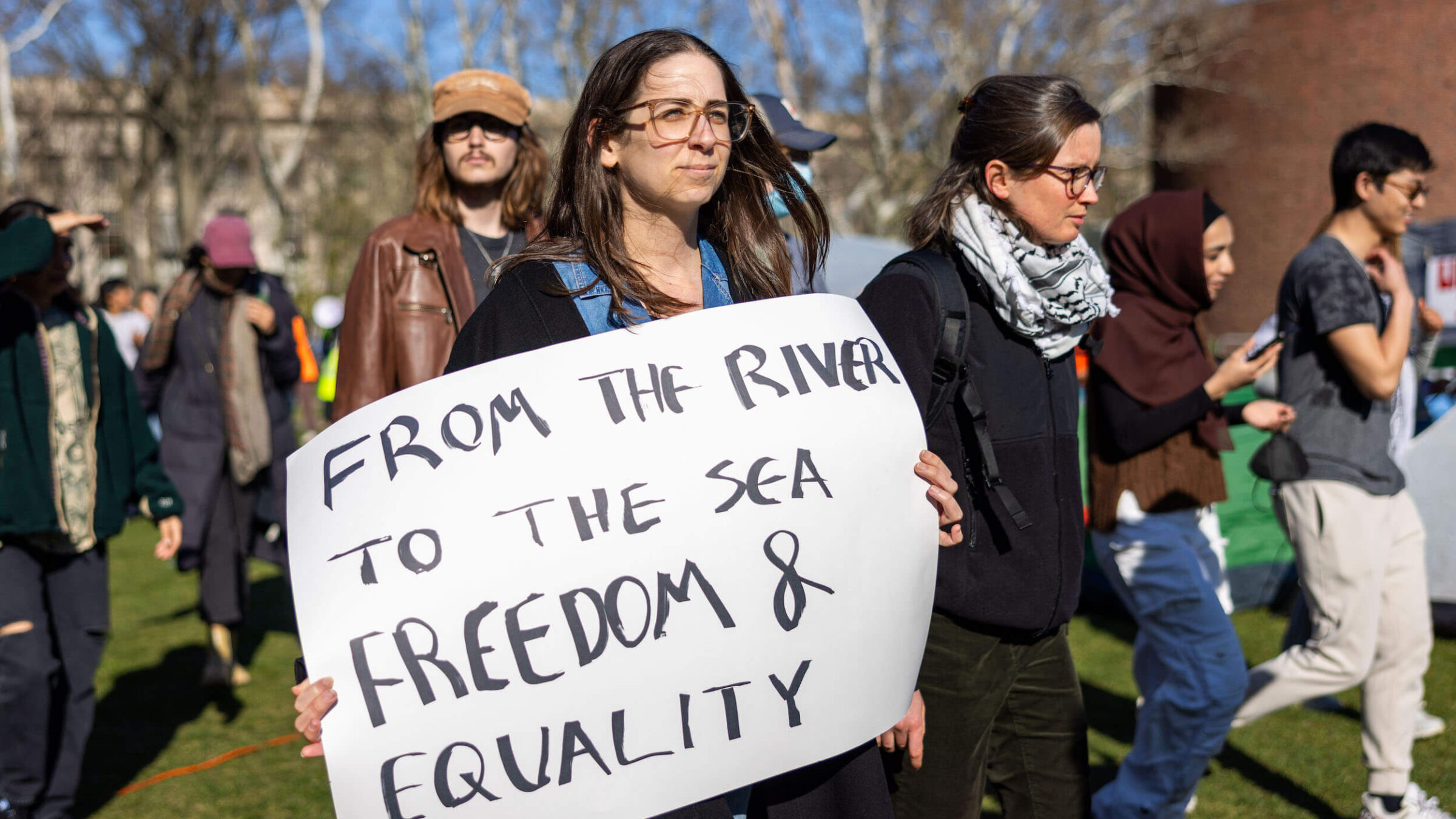I’m a Harvard professor. The extremism of student protesters reminds me of the worst I saw as an undergraduate in the 1960s
Why can’t activists be idealistic but not hateful, selfless but not self-righteous?

Students from Harvard University and the Massachusetts of Technology rally at a protest encampment by The Scientists Against Genocide at MIT on April 22. Photo by Scott Eisen/Getty Images
CAMBRIDGE, Mass. — Inside the Harvard Square subway station as I headed home from campus a few days ago, I watched a group of pro-Palestinian protesters while waiting for my train. One actually held a sign with the single word “Hamas.”
I yelled out, in response, “Let Israel live.” A young man who seemed to be a leader of the demonstration looked at me and laughed. I felt insulted by his dismissive reaction, and watching the spectacle, I found myself thinking back to my own years as a Harvard undergraduate in the late 1960s.
Back then, too, I watched as nonviolent protests against the Vietnam War gradually morphed into extremism.
I was a sophomore in 1967, when Secretary of Defense Robert McNamara spoke on campus and was prevented from leaving Lowell House. By 1969, when a student strike had shut down Harvard for days, calls of “Peace now!” had been replaced by a chant celebrating the National Liberation Front, the communist body that the U.S. was fighting against in Southeast Asia. “Ho, Ho, Ho Chi Minh, NLF is gonna win,” they chanted then, something akin to today’s “Intifada revolution.”
Then, in 1970, the year I graduated, a group of Weather Underground radicals accidentally blew up a Greenwich Village townhouse with one of several bombs they intended to place that evening — including one at Columbia University, and one at a U.S. Army facility. That fall, when I was studying in Sweden on a Fulbright scholarship, I watched from afar as the student radicals divided into two factions — one more culturally radical, engaged in drugs and a sexual revolution; the other somewhat puritan — that literally shouted at each other in Harvard Yard, each waving Mao’s Little Red Book of slogans.
The movement soon disintegrated. It was followed by the venture capital and private equity generation, where — at least from my vantage point on the faculty of Harvard’s Kennedy School of Government — students of the 1980s seemed to hold no higher ambition than making money.
Neither of these paths — political extremism and violence, or money-grubbing and selfishness — is an attractive model for our students today.
I would like to be celebrating the return of student activism. The world needs idealists, and I see the young people who volunteer for the Peace Corps or teach in tough inner-city schools as heroes. Some were my students, like Andrew Vogt, who did the Peace Corps in Ukraine before coming to the Kennedy School, and later worked on combating loose nukes at the National Nuclear Security Administration.
But I am upset about the widespread silence from the pro-Palestinian student activists about Hamas. This is a group of terrorists who slaughtered 1,200 people in Israel, including hundreds of Israelis attending a music festival, and whose leaders have openly stated they yearn for massacres like that of Oct. 7 to happen again and again.
I am not sure whether the most accurate way to describe Hamas is as violent left-wing revolutionaries or retrograde religious fanatics, but neither is a model today’s students should admire. This is not just a group that the United States and European Union consider to be a terror organization; it’s one that has executed people in Gaza for being gay, that subjugates women, and that committed egregious acts of sexual violence against them during the Oct. 7 attack.
Decent people should recoil from Hamas in disgust.
But where are the pro-Palestinian student activists — particularly, non-Jewish ones — willing to speak up against Hamas on campus?
I originally wrote this piece for The Harvard Crimson, the main student newspaper on campus, and one of its editorial chairs told me by email it would likely be published on Monday night. But on Tuesday, he withdrew his prior acceptance of the piece, saying that he thought students would not believe the opening anecdote of what I saw in the subway, and that the argument about protesters failing to condemn Hamas was “questionably factual.”
“Many of the Harvard pro-Palestine groups have condemned Hamas,” wrote the editor, a junior named Tommy Barone. “Indeed, many of them have a significant number of Jewish members.”
Yet such condemnations have been few and far between. And I am shaken by the editor’s belief that Harvard students would not find a professor’s accounting of a subway demonstration credible, likely because they disagreed with his political views.
I am also glad, more broadly, that there are so many students today whose ambitions for life go beyond making a pile of money. That is precious. But is it possible to hope for students who are idealistic without being hateful, selfless but not self-righteous?
I want to believe that is not too much to ask for. It is up to students to demonstrate that they can walk this crucial line.
A message from our CEO & publisher Rachel Fishman Feddersen
I hope you appreciated this article. Before you go, I’d like to ask you to please support the Forward’s award-winning, nonprofit journalism during this critical time.
We’ve set a goal to raise $260,000 by December 31. That’s an ambitious goal, but one that will give us the resources we need to invest in the high quality news, opinion, analysis and cultural coverage that isn’t available anywhere else.
If you feel inspired to make an impact, now is the time to give something back. Join us as a member at your most generous level.
— Rachel Fishman Feddersen, Publisher and CEO